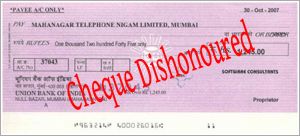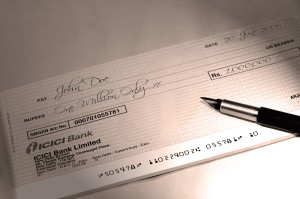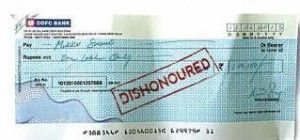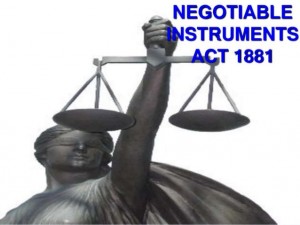In this blog post, Sreeraj K. V., a student of Government Law College, Ernakulam, Kerala writes about the legal procedures to be complied with when a cheque is dishonoured. This blog post covers areas like the importance of cheque, dishonor of a cheque and its remedies and the legal recourse available with the help of certain laws in India.
Introduction
All banks in India are being administered and their operations amended purely with the help of certain statutes, mainly by the Negotiable Instruments Act, 1881, the Reserve Bank of India Act, 1934 and the Banking Regulations Act, 1949. Now, let’s look into the various matters affecting a cheque as a major negotiable instrument and the legal formalities to be fulfilled by the parties when a cheque gets bounced or is dishonoured.
Cheque
A cheque as a negotiable instrument has been clearly defined under Section 6 of the negotiable instrument Act. A ‘cheque’ is a bill of exchange drawn on a specified banker and not expressed to be payable otherwise than on demand, and it includes the electronic image of a truncated cheque and a cheque in the electronic form[1]. In simple words, a cheque is a document drawn by a person for another person to whom he has agreed to pay a certain sum of money within a certain period. Business transactions are growing at a rapid pace. So, it is difficult for a person to transfer liquid money to another person. In such situations, a cheque acts as a medium of transferring money from person to person so that the transfer will be safe and both the parties can save their time to a great extent.
Even though a cheque has many merits on one hand, transfer of money through the way of cheque needs some procedures to be followed.The person who issues the cheque (drawer) must have a bank account; the cheque must be given some liability to the recipient (payee) and in terms of money, there must be sufficient amount in the bank account of the drawer for the cheque to be issued and not to be dishonoured due to insufficiency of fund; and most importantly, it must be a crossed cheque so that only the payee can receive the amount and the misuse of cheque can be reduced.
Dishonour of cheque
Business transactions of people is increasing day by day and the stability of maintaining bank balance has been fluctuating depending upon the financial needs of the people. If a person issues a cheque to another, he/she may not be aware of the current bank balance and thus the cheque may be dishonoured. In such situations, the drawer of the cheque is given a 30 days’ time for repaying the amount back to the payee. But after that period, if the drawer is not willing to pay the amount, the payee has an option to file a suit against the drawer for payment of the amount of the cheque as well as an amount of interest as compensation for the default caused by the drawer.
Legal recourse
When a cheque is dishonored, the bank will issue a ‘cheque return memo’ to the banker of the payee mentioning the reason behind the dishonor of cheque. The banker then transfers the cheque return memo along with the dishonored cheque to the payee. Then the payee may issue a notice to the drawer for the payment of amount within 15 days from the date of issue of the cheque and resubmit the cheque within 30 days from the date mentioned on the cheque on a belief that the cheque will not be dishonored this time. If the cheque is being dishonored again, the payee has the right to prosecute the drawer legally for the dishonour of the cheque. The payee can prosecute the drawer of the cheque only when the cheque has been issued towards the discharge of liability or debt by the drawer. If the cheque was issued as a gift or towards lending of loan for any unlawful purposes, the payee has no right to sue the drawer when the cheque gets dishonoured.
The Negotiable Instruments Act, 1881 deals with the cases of dishonour of cheques. According to Section 138 of the Act[2], dishonour of the cheque is a criminal offense and is punishable by an imprisonment of two years along with a monetary compensation as fine or both. This Section of the Act states that the dishonour of the cheque may occur when a person, for the payment of any liability or debt to another person, issues a cheque in favour of that person and due to the insufficiency of fund or if the prescribed amount exceeds the limit of amount to be paid from that bank, then the person is deemed to have committed the offence. The bank also has a right to stop the cheque facility to the person and even close his account when repeated offenses of cheque bounce occur.
In certain cases, the defaulter can appeal to the Sessions Court within one month from the date of judgment of the lower court. If both the parties are not interested in wasting much time, an out of court settlement is also applicable at any point. In many cases, the party files a separate civil suit against the defaulter for the recovery of the amount mentioned in the cheque along with a reasonable rate of interest as compensation.
Summary suits
In many circumstances, the defendant will have no defense of his own. In such a situation, the plaintiff can file a ‘summary suit’ under Order 37 of the Code of Civil Procedure, 1908[3]. Here the defendant will be given no chance to defend himself unless he procures permission from the court to defend. Summary suits are being filed mainly in civil matters based on recovery procedures. It includes promissory notes, bills of exchange and cheques. It does not have a form of criminal charge as it only focuses on the recovery of the debt or property from the defendant without much delay.
Amendment to the Act
Even though Negotiable Instruments Act has been amended many times due to several reasons, the landmark amendments in the Act were done twice before the recent amendment done in 2015. The latest amendment adopts various principles regarding the jurisdiction of the courts in dealing with such matters. In many cases, the drawer will be in one place, and the payee will be far away from the drawer. In such cases, the parties find it difficult to go through the penal actions which follow. By the new amendment, the holder of the cheque can file a suit before a magistrate at his place of residence and the place where he tendered the cheque. Thus litigation expenses will be reduced, and the drawers of the cheque will be more careful while signing the cheque[4].
According to the newly implemented Section 142A, any case of the same nature, whether filed before or transferred before, shall go to the courts having jurisdiction under the new procedure[5].
Conclusion
Dishonour of the cheque is one of the major issues faced by the parties while transferring money through negotiable instruments. It will make the drawer liable even though he was unaware of the insufficiency of the fund in his account within a prescribed limit of time. But the law itself provides a reasonable time for them to repay back the amount to the payee. The default made after such a period has to be considered as a criminal act as it involves an unlawful intention of not paying back the money to the deserving party. Thus, the law makes it clear that the parties while signing a cheque have to be aware of the amount of money in their concerned banks.
Footnotes:
[1]Section 6 – Negotiable Instruments Act, 1881
[2]Section 138 – Negotiable Instruments Act, 1881
[3]Order 37 – Code of Civil Procedure – Summary suit
[4]Retrieved on http://www.business-standard.com/article/opinion/the-negotiable-instruments-amendment-bill-2015-115080900761_1.html
[5]Section 142 A – Negotiable Instruments Act, 1881, retrieved on http://www.business-standard.com/article/opinion/the-negotiable-instruments-amendment-bill-2015-115080900761_1.html
 Serato DJ Crack 2025Serato DJ PRO Crack
Serato DJ Crack 2025Serato DJ PRO Crack















 Allow notifications
Allow notifications


